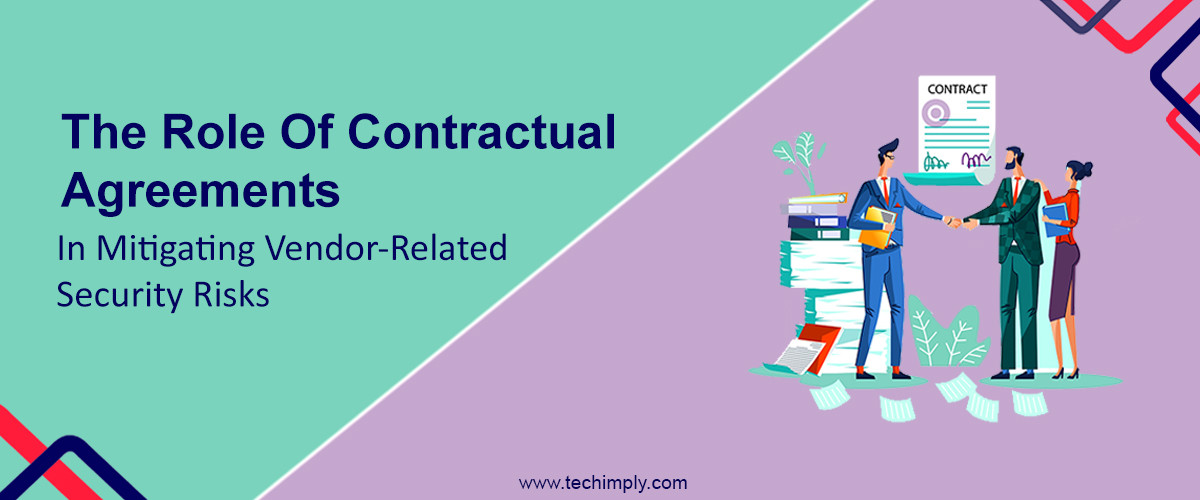In the rapidly evolving landscape of digital commerce and business partnerships, the reliance on third-party vendors has become a cornerstone for many organizations. While these collaborations offer numerous benefits such as increased efficiency, specialized expertise, and cost-effectiveness, they also introduce a significant element of risk, especially in terms of cybersecurity. The challenge for businesses today lies in effectively managing these risks to safeguard sensitive data and maintain operational integrity. One pivotal tool in this effort is the strategic use of contractual agreements.
Understanding Vendor-Related Security Risks
Third-party vendors often have access to critical systems, sensitive data, or infrastructure, which makes them a potential entry point for cyber threats. Whether it's through inadequate security measures, vulnerabilities in their systems, or human error, these vendors can inadvertently expose the organizations they work with to cyberattacks, data breaches, or other security incidents.
The consequences of such breaches can be severe, encompassing financial losses, damage to reputation, legal ramifications, and the loss of customer trust. Consequently, companies are increasingly aware of the importance of mitigating these risks through proactive measures.
The Role of Contractual Agreements
Contracts serve as a foundational element in business relationships, outlining the terms, expectations, and responsibilities of each party involved. When it comes to cybersecurity and vendor management, well-structured contracts play a crucial role in reducing potential risks and liabilities. Here's how contractual agreements contribute to mitigating vendor-related security risks:
1. Defining Comprehensive Security Requirements
Contracts provide an avenue to explicitly outline security requirements, standards, and protocols that vendors must adhere to while handling sensitive information or accessing critical systems. This includes details about encryption standards, data handling procedures, access controls, incident response protocols, and compliance with relevant regulatory frameworks (such as GDPR, HIPAA, etc.). These requirements could encompass:
-
Encryption Standards: Mandating the use of encryption for sensitive data in transit and at rest to protect information from unauthorized access.
-
Access Controls: Specifying who within the vendor's organization has access to the organization's systems and data, implementing role-based access controls (RBAC), and multi-factor authentication (MFA) where applicable.
-
Data Handling Procedures: Outlining procedures for data handling, including storage, transfer, processing, and disposal, by industry best practices and relevant regulations.
-
Incident Response Protocols: Defining procedures and timeframes for reporting security incidents, as well as the steps to be taken in case of a breach, to minimize damage and facilitate prompt resolution.
2. Establishment of Liability and Accountability
Clear delineation of responsibilities and liabilities in case of security breaches or incidents is fundamental in contracts. Defining who is accountable for what scenarios encourages vendors to implement robust security measures and swiftly address any breaches, knowing the repercussions outlined in the contract. Contracts should clearly outline the responsibilities and liabilities of both parties concerning cybersecurity:
-
Vendor Responsibilities: Specifying the security measures the vendor is obligated to implement and maintain, as well as their responsibility to promptly address any security incidents or breaches.
-
Organizational Responsibilities: Defining the organization's obligations regarding providing necessary support, information, or resources to enable the vendor to meet the agreed-upon security standards.
3. Regular Audits and Compliance Checks
Contracts can stipulate regular security audits or compliance checks that vendors must undergo. This ensures that they maintain the necessary security standards throughout the partnership. Contracts can stipulate regular security audits or compliance checks that vendors must undergo:
-
Frequency: Establishing how often security audits will be conducted to ensure ongoing compliance.
-
Scope: Defining the scope of the audit, which may include network assessments, vulnerability scans, penetration testing, and compliance checks against relevant standards.
4. Termination Clauses
Including clauses that address breaches of security standards and its consequences, up to and including contract termination, acts as a deterrent for vendors to neglect security measures. Including clauses that address breaches of security standards and their consequences:
-
Breach Notification: Specifying the procedure and timeline for reporting a security breach.
-
Escalation Steps: Outline the steps to be taken in the event of repeated or severe security violations, potentially leading to contract termination or other legal actions.
5. Data Handling and Ownership
Contracts should explicitly specify how data is handled, stored, and transferred by the vendor. It should also address issues related to data ownership, ensuring that the organization retains control and ownership of its data at all times. Contracts should explicitly address how data is handled and protected:
-
Data Ownership: Clearly stating that the organization retains ownership of its data and specifying how the vendor should handle and protect this data.
-
Data Retention and Disposal: Establishing protocols for data retention and secure disposal at the end of the contractual relationship or as per regulatory requirements.
Importance of Clarity and Collaboration
Effective contractual agreements demand clarity, collaboration, and continuous communication between the parties involved. Regular dialogue, joint reviews of security measures, and updates to the contract to address emerging threats are crucial for maintaining a strong security posture.
By incorporating these elements into contractual agreements, organizations can significantly reduce the inherent risks associated with third-party vendor relationships, thereby fortifying their overall cybersecurity defenses and safeguarding sensitive information from potential threats. Here's a deeper exploration of these critical aspects:
1. Clarity in Communication
Clear Expectations:
-
Mutual Understanding: Both parties must have a shared understanding of the contractual obligations, especially regarding security requirements.
-
Precise Language: Contracts should employ unambiguous language to articulate security measures, responsibilities, and liabilities.
Regular Communication:
-
Ongoing Dialogue: Establishing open channels of communication to discuss security-related concerns, updates, or changes throughout the partnership.
-
Feedback Mechanisms: Encouraging feedback from both parties to address evolving security needs and adapt contractual agreements accordingly.
2. Collaboration for Effective Security Measures
Joint Planning and Implementation:
-
Risk Assessments: Conducting joint risk assessments to identify potential vulnerabilities and threats within the vendor relationship.
-
Cooperative Security Measures: Collaborating on the design and implementation of security controls and measures to ensure alignment with both parties' needs.
Training and Education:
-
Vendor Training: Providing necessary training and resources to vendors about security best practices and organizational policies.
-
Shared Knowledge: Facilitating knowledge exchange on emerging threats, trends, and cybersecurity solutions to enhance mutual preparedness.
3. Continuous Monitoring and Assessment
Regular Reviews:
-
Periodic Assessments: Conduct regular reviews of security practices, adherence to contractual obligations, and compliance with evolving regulations.
-
Performance Metrics: Defining and measuring key performance indicators (KPIs) related to security to evaluate the vendor's performance.
Incident Response Collaboration:
-
Joint Incident Response Plan: Collaborating on incident response planning, including communication protocols and coordinated actions in case of a security breach.
-
Post-Incident Analysis: Conduct post-incident reviews jointly to identify root causes and implement preventive measures.
4. Adaptation and Improvement
Flexibility in Contracts:
-
Scalability and Flexibility: Allowing for scalability and flexibility within contractual agreements to accommodate technological advancements, regulatory changes, or business expansions.
-
Revision and Updating: Regularly revising and updating contracts to reflect the evolving threat landscape and address any shortcomings in security provisions.
Continuous Improvement:
-
Learning from Incidents: Using insights gained from security incidents or near-misses to enhance security measures and strengthen the partnership.
-
Feedback Loops: Encouraging feedback loops between both parties to continuously improve security practices and contractual frameworks.
Conclusion
In conclusion, contractual agreements serve as a proactive mechanism for businesses to manage and mitigate vendor-related security risks effectively. These agreements help set clear expectations, enforce security standards, and establish accountability between organizations and their vendors. However, it's crucial to note that contractual agreements alone aren't sufficient; regular monitoring, communication, and ongoing risk assessments are necessary to ensure compliance and address emerging threats effectively.
By leveraging robust contracts that encompass stringent security clauses, organizations can significantly enhance their security posture and foster a more secure and resilient business ecosystem amidst an increasingly interconnected digital landscape.






